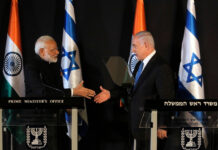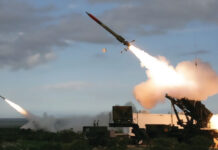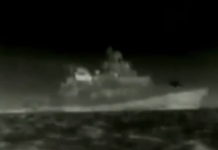The twin blasts that caused such devastation in Algeria this week posted a grim announcement that an Islamic group, once thought to have been defeated, is back in its bloody business. Poised to extend its ruthless tactics throughout North Africa, it is making the first stop towards its ultimate target – the European continent. Al-Qaeda in the Islamic Maghreb, (AQIM) is becoming a dominant element in Osama Bin Laden’s global terror ambition. The attack in Algeria last Tuesday seems clearly linked to the regional strategy of weakening the secular governments in North Afirca, the Maghreb, resuming the 1990s warfare against Kuffar (infidel) institutions, society and administrations.
But unlike in the past decade, these operations are now strategically coordinated with Al-Qaeda central direction, not only in terms of operations, but by distinct policies and international decision-making.
The Jihadist incitement against the Algerian authorities, including mostly via the al-Jazeera shows, usually indicates the trends to come. Algiers was accused by the Salafi forces as “betraying the Muslim world and associating with French kuffar.” The recent visit by French President Nicholas Sarkozy to Algeria may well have contributed to the strikes which came already in line with this incitement.
AQIM emerged in 2006 from the remnants of the Salafist Group for Preaching and Combat, an Islamic group best known in the 1990s for its grisly tactic of wiping out entire villages it considered insufficiently fervent in their religious beliefs. The group was believed to be virtually eliminated by 2001, when Algerian security forces cracked down on their leaders. But last year, on the fifth anniversary of the 9/11 terror attacks, Al-Qaeda lieutenant Ayman al-Zawahiri released a videotape announcing that the group had joined forces with Osama bin Laden. Al-Zawahiri praised the “blessed union,” declared France an enemy and urged Al-Qaeda’s newest franchise to fight against French and American interests.
 In January 2007, the group announced that it had changed its name to Al-Qaeda in the Islamic Maghreb. Soon after, the resurgent group went on the offensive April 11, detonating two car bombs. One car bomb exploded close to the prime minister’s office in Algiers, resulting in the death of 33 people and more than 150 wounded. In September the AQIM targeted President Abdelaziz Bouteflika himself, when a suicide bomber blew himself up in the middle of a crowd waiting for the Algerian president.
In January 2007, the group announced that it had changed its name to Al-Qaeda in the Islamic Maghreb. Soon after, the resurgent group went on the offensive April 11, detonating two car bombs. One car bomb exploded close to the prime minister’s office in Algiers, resulting in the death of 33 people and more than 150 wounded. In September the AQIM targeted President Abdelaziz Bouteflika himself, when a suicide bomber blew himself up in the middle of a crowd waiting for the Algerian president.
Analysts believe that one of the reasons for the rise in Al Qaeda’s terrorist activities in the Maghreb stems from the group’s defeat in Western Iraq earlier this year.
On October 22nd, Osama bin Laden surprisingly admitted that al Qaeda had lost its war in Iraq. In an audiotape speech titled “Message to the people of Iraq,” bin Laden complained of disunity and poor use of resources. He admits that Al-Qaeda made mistakes, and that all Sunni Arabs must unite to defeat the foreigners and Shia Moslems. Two months later it was Abou Omar Al Baghdadi the supposed leader of the “Islamic State in Iraq” which is actually Al-Qaeda there, said that only 200 Mohajeroon (“immigrants” in Arabic) are left in Iraq. In fact, Al-Qaeda fighters have been migrating to northern areas of Iraq after being chased out of safe havens in Baghdad and other volatile regions. Sunni and Shia warlords got tired of Americans spinning their wheels, while building up the surge, seized and chased out Al-Qaeda from Anbar province.
As for their new Algerian venue, the creation of AQIM was not Al-Qaeda’s first attempt to establish a branch in North Africa. In 2005, Moroccan security forces exposed and captured a cell of Al-Qaeda operatives. The cell’s leaders had close relations with AbuMus’ab Al-Zarqawi and with other top Al-Qaeda commanders. According to Moroccan and European security sources, they confessed that they were planning to establish what was to be called “The Al-Qaeda Organization in the Arab Maghreb” – and the name as that eventually authorized by bin Laden for the new Groupe Salafiste pour la Predication et le Combat (GSPC) or Salafist Group for Call and Combat. French counter-terrorist agents are concerned with the group’s considerable strategic depth in the Sahara and geographical proximity to Europe. Al-Qaeda’s new North African wing threatens to turn the western Mediterranean basin into a live front in the global jihad.
The blowback effect with Algerian fighters, who have honed terrorist skills in attacks in Iraq and are now returning to Algeria with the intention of replicating similar atrocities is boding a somber outlook. It is very much the way the previous generation returned hardened from the Afghanistan experience during the Soviet occupation in the mid-1980s. But not only in Algeria is Al-Qaeda establishing its new stronghold. Counter-insurgency experts said this week that Al-Qaeda Organization for the Islamic Maghreb – the product of a 2006 merger with the Salafist Brigade for Combat and Call, or GSPC – has been franchised to virtually every Arab state in North Africa. They said the networks maintained contact and coordinated major strikes. GSPC has become, as it were, a sort of regional branch of Al Qaeda its mission being to federate all the radical, Salafist organizations in North Africa – Moroccan, Libyan and Tunisian have already joined forces with bin Laden’s global terrorist groups.
 The Algerian GSPC is led by Abd Al-Wadoud, whose real name is Abdelmalek Droukdal, whom a top secret French intelligence report classified as the main terrorist threat to France and Europe. In fact, never in the past has Al-Qaeda had such a solid territorial base in such proximity to Western states, and it has already threatened to employ this base to attack Europe.
The Algerian GSPC is led by Abd Al-Wadoud, whose real name is Abdelmalek Droukdal, whom a top secret French intelligence report classified as the main terrorist threat to France and Europe. In fact, never in the past has Al-Qaeda had such a solid territorial base in such proximity to Western states, and it has already threatened to employ this base to attack Europe.
The unification of the North African jihad groups under the banner of Al-Qaeda, the use of the Sahara for training and arms-smuggling, and the number of North African cells discovered in Europe in the past all indicate the magnitude of the threat. “An attack perpetrated by local or international networks remains likely,” warned Gilles de Kerchove, newly appointed in September to coordinate counter-terrorism efforts among EU member states, told the European Parliament.
The emergence of a new Al-Qaeda-linked organization in Northern Africa is particularly alarming to Spain, which is concerned about Islamists’ calls for the reconquest of the country they regard as a lost part of the Muslim world. “We will not be in peace until we set our foot again in our beloved al-Andalus” an Al-Qaeda leader in the Islamic Maghreb said on claiming responsibility for an attack which killed at least 24 people in Algiers. Andalus is the Moorish name for Spain, parts of which were ruled by Muslims for about eight centuries until the last Moorish bastion, Granada, succumbed to the Christian Reconquest in 1492. The reference to al-Andalus was not the first by Al-Qaeda, which has also vowed to put an end to the Spanish occupation of the enclaves of Ceuta and Melilla on the Moroccan coast. Such announcements worry the security services in Spain, where 29 mainly Moroccan suspects are on trial for the 2004 Madrid train bombings that killed 191 and injured about 1,800 people.
“Today, the threat posed by this alliance of the GSPC and Al-Qaeda constitutes a heightened threat to the countries of Northern Africa, which have been destabilized and can be destabilized even more, but also to France, which is considered as a priority target…” said Jean-Louis Bruguiere, France’s top anti-terrorism judge, in a recent interview. The United States also has long been concerned about the GSPC and is working with Algeria and its neighbors to combat the perceived threat through a program called the Trans-Sahara Counter-Terrorism Partnership, worth an estimated $600mn over the next five to seven years.
Al-Qaeda may have lost its grip in some areas, but certainly has grown into dangerous proportions in another highly strategic environment, creating “clear and present” threat to European nations, which already have a significant portion of unstable Muslim immigrants, an ideal breeding ground for local terrorist and insurgency.
For further reading we recommend:
- Holy War Inflames Strategic Horn of Africa (12/2006)
- The Zaidi Shi’a in Yemen – Iran’s Next Objective (1/2007)
- Al Qaeda spurs Gaza carnage to create Hamastan (5/2007)


















